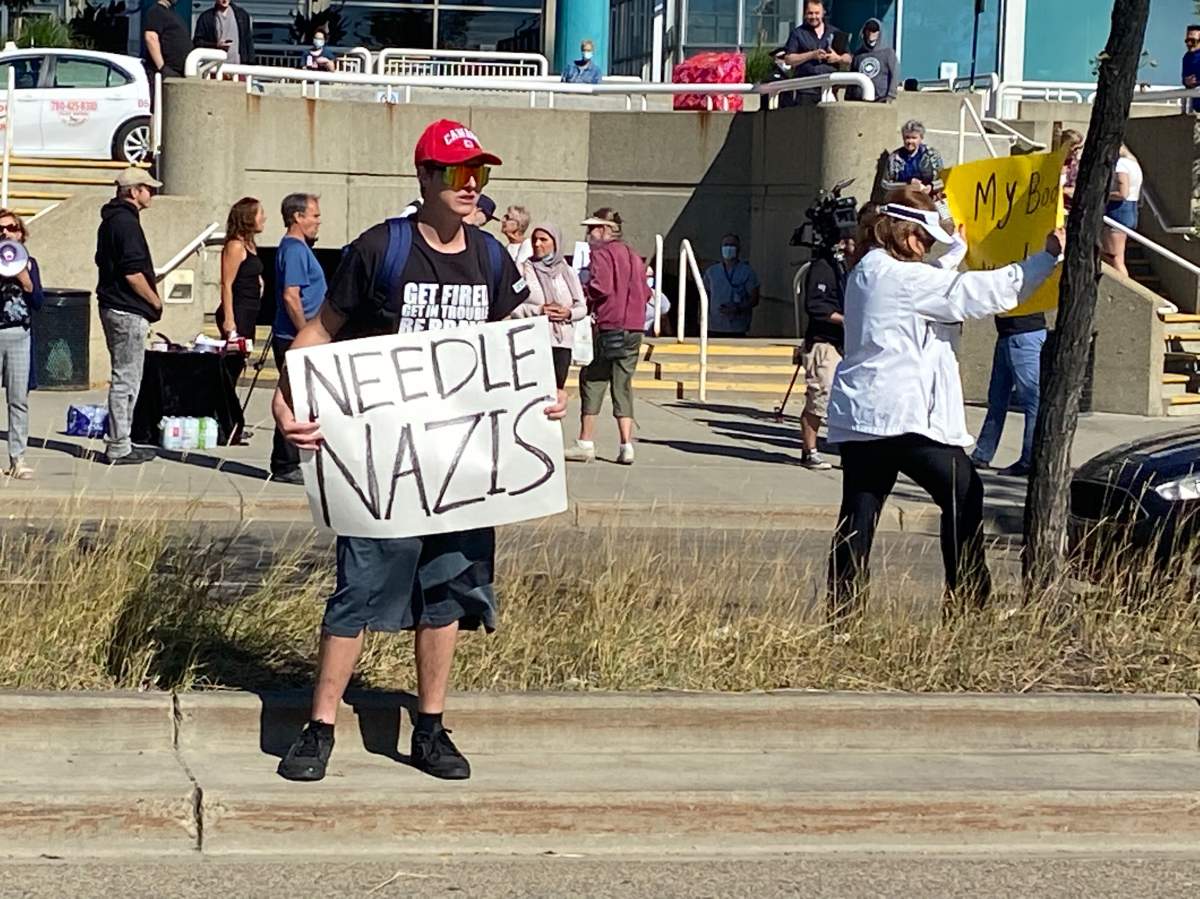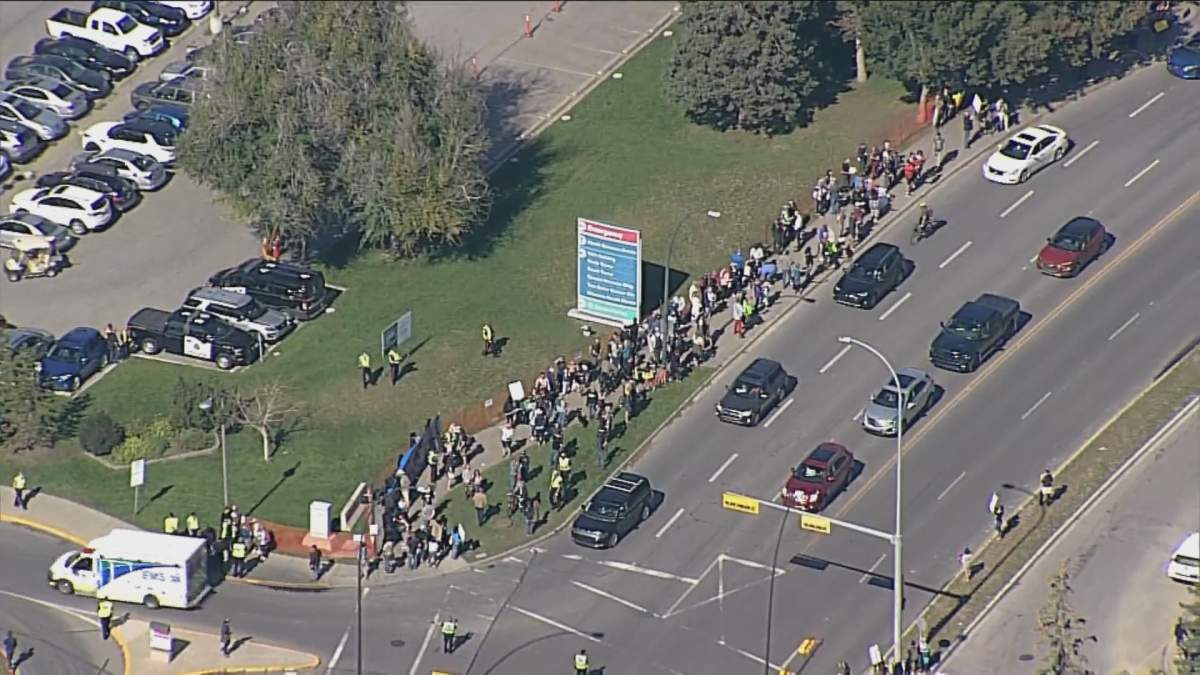Protesters were stationed outside hospitals in Alberta’s biggest cities again on Monday, carrying signs, shouting at patients and health-care workers and angrily expressing their opposition to mandatory COVID-19 vaccination policies.

The demonstrations across the country have garnered a great deal of criticism in recent days, with political leaders, health-care professionals and health-care advocates condemning the decision to not only rally outside acute care centres but also interfere with patients and staff getting to hospitals.

Amy Kaler, sociology professor at the University of Alberta’s sociology department, said while people have been protesting various facets of the province’s COVID-19 response for months, the shift to protesting outside hospitals marks a change in sentiment.
“When you move from demonstrating and protesting — which is people’s right — to interfering with hospitals, you’ve gone over a line that can’t be crossed,” she said.
“I find it really demoralizing, and… I’m not a health-care worker.”
According to Lorian Hardcastle, associate professor of health policy and law at the University of Calgary, the nature of these protests shows just how tense things have gotten in Alberta when it comes to COVID-19.
“I think that the approach to the pandemic has been quite a polarizing one here, and I think that these protests are just evidence of that,” she said.
“In some ways, the government’s messaging has contributed to the tension and polarization and the protests that we’ve seen in Alberta.
“We’ve heard a lot of discussion from the government around individual rights and not a lot on the facts that we can limit individual rights where reasonable and where justified and where proportionate.”
The Alberta government, health authority and the police forces of Edmonton and Calgary have all condemned the act of protesting outside a hospital, stressing that acute care centres are where people seek medical attention and that should not be interfered with.

In an emailed statement, Premier Jason Kenney said while Canadians have the right to protest, blocking people’s access to hospitals is “most definitely not peaceful protest.”

Get weekly health news
“Today’s protests must in no way obstruct the important operations of our hospitals, including the arrival and departure of emergency vehicles and workers,” Kenney said, adding that law enforcement agencies are empowered to enforce the law in a timely fashion, including through the Critical Infrastructure Act.
“While Canadians are entitled to peaceful protest, one can still question the appalling judgment of those protesting across the country today,” the premier said.
“It is outrageous that a small minority feel it’s appropriate to protest at hospitals during the pandemic while our health-care workers continue to tirelessly battle the global menace of COVID-19.”
Hardcastle said if tickets are handed out under Bill 1 — the Critical Infrastructure Defence Act — it could be problematic with having them stick due to the fact that the law could be found to be unconstitutional. She said it could “normalize” the law being used against other less-polarizing protests, such as by groups like Black Lives Matter.
“On the other hand, if they use their ordinary powers under the criminal law to prevent physical violence, to prevent threats, to prevent harassment, those are well-established criminal charges that exist, and I think those would be much more likely to stick,” she said.
Kaler said she’d like to see a stronger response from the UCP government in terms of putting a stop to these protests and making it clear the message isn’t welcome in Alberta.
“If he were to be properly masked and so forth in a hospital saying, ‘I am here with the doctors and nurses, I stand with them. Those of you out there, I don’t want you voting for me. I don’t want anything to do with you. I want you to go home,’ I think that that might give a little boost to morale,” she said.
Hardcastle said she believes the government will have to introduce more measures in the coming days or weeks to lighten the load hospitals are facing, both with ever-increasing COVID-19 patients and now protests outside their doors.
“I just don’t think that they can let the hospital situation play out as it has been. I think our hospitals are stretched too thin,” she said.
“I think the government is going to have to implement something, whether it’s vaccine passports or business restrictions, gathering restrictions, and I think, again and again, we’ve seen the government do that quite late, particularly when we compare to some other provinces.”
Alberta Health Services said it was “extremely disappointed” by the protests at hospitals.
“We have no tolerance for intimidation or bullying of our patients, AHS staff or physicians and find such behaviour abhorrent,” AHS said.

The health authority said it was working closely with police and AHS protective services to ensure patients and staff are able to access health-care facilities safely, adding that fencing would be put up to keep people safe if need be. Patients and employees are also being encouraged to use the SafeWalk service.
“If you oppose masking, vaccinations or any other measures taken to prevent COVID-19 transmission, that is your right. But to target health-care workers with anger and vitriol is not acceptable, particularly now,” it said.







Comments
Want to discuss? Please read our Commenting Policy first.